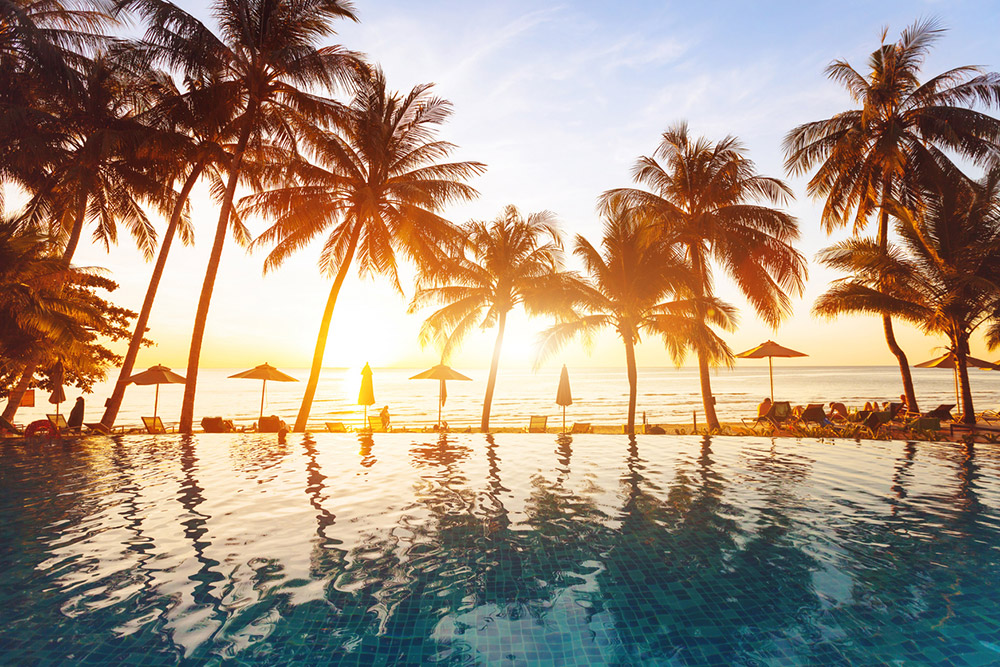Tropical Places to Vacation: Escape to paradise with this comprehensive guide. We delve into the best destinations, offering insights into budgeting, activities, accommodation, and cultural considerations for an unforgettable trip. From luxurious resorts to budget-friendly options, we cover diverse travel styles and help you plan your perfect tropical getaway, ensuring a seamless and enriching experience. This guide provides practical advice, stunning descriptions, and essential information to make your dream vacation a reality.
Whether you dream of sun-drenched beaches, vibrant coral reefs, or lush rainforests, this guide explores a diverse range of tropical destinations across the globe. We examine various factors to consider when planning your trip, from selecting the ideal destination and setting a realistic budget to understanding local customs and embracing eco-friendly practices. Ultimately, this guide aims to empower you to create a memorable and responsible tropical vacation.
Best Tropical Vacation Destinations
Choosing the perfect tropical getaway can feel overwhelming, given the sheer number of stunning locations worldwide. This section highlights ten exceptional destinations, categorized by continent, offering a glimpse into their unique charms and ideal visiting times. Each location offers a distinct blend of natural beauty, cultural experiences, and recreational opportunities, ensuring a memorable vacation.
Top Tropical Vacation Destinations
Planning a tropical vacation requires considering factors such as climate, activities, and cultural experiences. The following table provides a concise overview of ten remarkable destinations, categorized by continent, along with their key attractions and ideal visiting periods.
| Destination | Continent | Key Attractions | Best Time to Visit |
|---|---|---|---|
| Maldives | Asia | Overwater bungalows, pristine beaches, world-class diving and snorkeling, luxurious resorts. | November to April (dry season) |
| Bali, Indonesia | Asia | Volcanic landscapes, rice paddies, vibrant culture, ancient temples (Uluwatu Temple, Tanah Lot), surfing beaches (Kuta). | April to October (dry season) |
| Hawaii, USA | North America | Volcanoes National Park, diverse beaches, lush rainforests, whale watching (winter months), unique Polynesian culture. | April to May and September to October (shoulder seasons) |
| Fiji | Oceania | Coral reefs, secluded islands, vibrant marine life, opportunities for diving, snorkeling, and relaxing on pristine beaches. | May to October (dry season) |
| Seychelles | Africa | Granite and coral islands, turquoise waters, diverse wildlife, luxurious resorts, opportunities for sailing and diving. | April to October (dry season) |
| Mauritius | Africa | Stunning beaches, lagoons, diverse marine life, hiking opportunities in volcanic mountains, cultural attractions. | September to April (summer) |
| Dominican Republic | North America | All-inclusive resorts, pristine beaches, lush rainforests, opportunities for water sports, historical sites. | December to April (dry season) |
| Mexico (Riviera Maya) | North America | Mayan ruins (Chichen Itza, Tulum), cenotes, pristine beaches, vibrant nightlife, diverse culinary scene. | November to April (dry season) |
| Costa Rica | North America | Rainforests, diverse wildlife, national parks (Manuel Antonio, Tortuguero), adventure activities (zip-lining, white-water rafting). | December to April (dry season) |
| Brazil (Fernando de Noronha) | South America | Unique volcanic archipelago, pristine beaches, exceptional diving and snorkeling opportunities, abundant marine life. | August to February (summer) |
Activities and Experiences in Tropical Locations
Tropical destinations offer a diverse range of activities catering to various interests and skill levels. From exhilarating water sports to tranquil nature explorations, the possibilities are virtually endless. The choice of activity often depends on personal preferences, budget, and the specific location’s offerings. This section will delve into some popular activities, highlighting their unique aspects and requirements.
Popular Tropical Activities
A selection of five popular activities in tropical locations provides a good overview of the diverse experiences available to visitors. These activities offer a blend of adventure, relaxation, and cultural immersion, ensuring a memorable vacation.
- Snorkeling: This relatively accessible activity allows for close-up observation of vibrant coral reefs and diverse marine life. Minimal equipment is required – a mask, snorkel, and fins – and basic swimming skills are sufficient. The experience is enhanced by calm, clear waters and abundant marine biodiversity.
- Scuba Diving: Offering a more immersive underwater experience than snorkeling, scuba diving requires certification and specialized equipment, including a scuba tank and regulator. Divers can explore deeper waters and encounter a wider range of marine species, from colorful fish to majestic sea turtles. Proper training is essential for safety.
- Hiking: Many tropical destinations boast lush rainforests and mountainous landscapes ideal for hiking. The difficulty level varies greatly depending on the trail chosen. Appropriate footwear, clothing, and hydration are crucial, especially in hot and humid conditions. Hikers can expect stunning views and encounters with unique flora and fauna.
- Surfing: This thrilling water sport requires balance, coordination, and a degree of physical fitness. Beginners can take lessons from experienced instructors, while more advanced surfers can tackle challenging waves. The ideal conditions include consistent waves and a relatively shallow, sandy bottom. Safety precautions, including the use of a leash and awareness of currents, are essential.
- Cultural Tours: Exploring the local culture adds depth to any tropical vacation. These tours can include visits to historical sites, local markets, and traditional villages. Interaction with local communities provides valuable insights into their way of life, traditions, and customs. Respect for local customs and appropriate attire are important considerations.
Comparison of Snorkeling and Scuba Diving
Snorkeling and scuba diving are both popular water sports that allow exploration of underwater environments, but they differ significantly in terms of depth, equipment, and skill requirements.
| Feature | Snorkeling | Scuba Diving |
|---|---|---|
| Depth | Shallow waters, surface level | Variable depths, reaching significant depths depending on certification and experience |
| Equipment | Mask, snorkel, fins | Scuba tank, regulator, BCD, wetsuit, fins, mask |
| Skills | Basic swimming ability | Certification and specialized training required |
| Cost | Relatively inexpensive | More expensive due to equipment rental/purchase and certification costs |
| Advantages | Accessible, requires minimal training, good for observing shallow reef ecosystems | Allows exploration of deeper waters and a wider range of marine life, more immersive experience |
| Disadvantages | Limited depth, restricted to surface level, less immersive | Requires significant training and investment, safety considerations are paramount |
Transportation in Tropical Destinations
Getting around tropical destinations offers a diverse range of options, each with its own set of advantages and disadvantages. The best choice depends heavily on your budget, the specific location, your comfort level, and your environmental concerns. This section will explore the most common transportation methods, highlighting their key features to help you make informed decisions for your next tropical getaway.
Flights
Air travel is often the quickest way to reach remote tropical islands or to cover significant distances between destinations. Domestic flights within island nations or between neighboring countries are frequently available and can be relatively affordable, especially if booked in advance. However, flight costs can escalate quickly, particularly for international journeys or during peak seasons. Furthermore, the environmental impact of air travel is substantial, contributing significantly to carbon emissions. Consider carbon offsetting programs if air travel is unavoidable.
Ferries
Ferries are a popular and often scenic option for island hopping. They provide a more sustainable alternative to air travel, with lower carbon emissions. The cost is generally lower than flights, especially for shorter distances. However, ferry journeys can be significantly longer than flights, and they are susceptible to weather delays. Seasickness is also a potential concern for some travelers. The comfort level can vary greatly depending on the ferry operator and the length of the journey.
Taxis and Ride-Sharing Services
Taxis and ride-sharing apps (where available) offer convenient point-to-point transportation within cities and towns. They are particularly useful for shorter distances or when traveling with luggage. However, costs can add up quickly, especially during peak hours or for longer trips. Negotiating fares beforehand is crucial in some locations, and it’s essential to be aware of potential scams. Ride-sharing services offer a more transparent pricing structure but may not always be available in all areas.
Rental Cars
Renting a car provides the most freedom and flexibility for exploring a destination at your own pace. This is particularly advantageous for visiting attractions outside of major cities or for those who prefer a self-guided itinerary. However, driving in some tropical locations can be challenging due to road conditions, traffic, and unfamiliar driving customs. Rental car insurance is highly recommended, and the cost of rental, gas, and insurance can be substantial. Parking can also be a significant issue in densely populated areas.
Navigating Public Transportation in Foreign Tropical Locations
Successfully navigating public transportation in unfamiliar tropical locations requires careful planning and preparation. Learning basic phrases in the local language related to transportation can be incredibly helpful. Download offline maps and transportation apps before your trip, as reliable internet access may not always be available. Consider using pre-paid transportation cards or purchasing tickets in advance to avoid long queues and potential scams. Be mindful of your belongings at all times and avoid traveling alone late at night. Familiarize yourself with local customs and etiquette related to public transportation. For example, some systems might require exact fare, and certain seats might be reserved for specific individuals. Observing local commuters can provide valuable insights into navigating the system effectively.
Ending Remarks
Planning a tropical vacation requires careful consideration of various factors, but with the right preparation and information, the journey can be exceptionally rewarding. This guide has provided a framework for creating a memorable and responsible tropical getaway, covering everything from budget planning and activity selection to understanding local cultures and minimizing your environmental impact. Remember to research your chosen destination thoroughly, pack appropriately, and embrace the unique experiences each location offers. Enjoy your paradise found!




